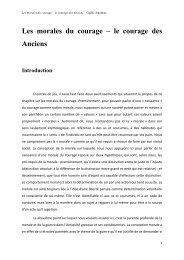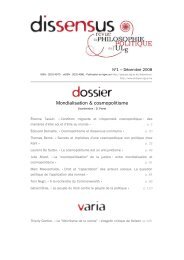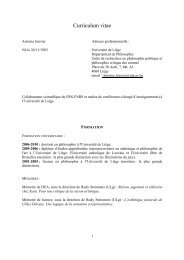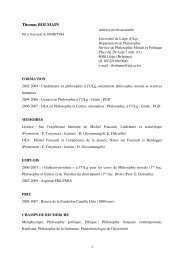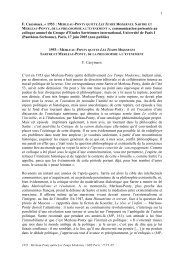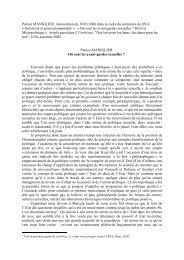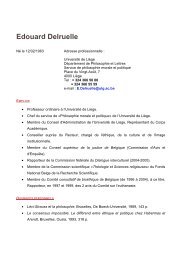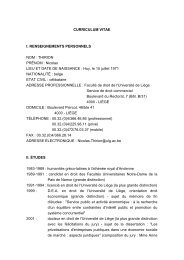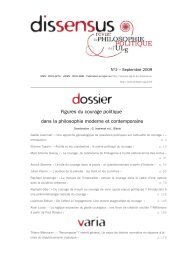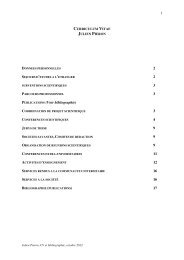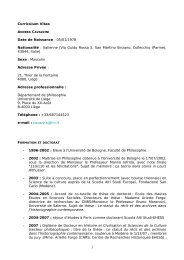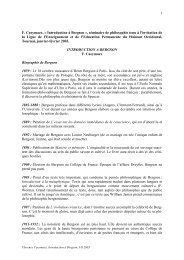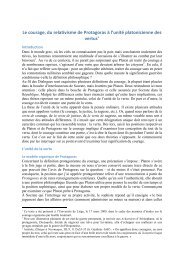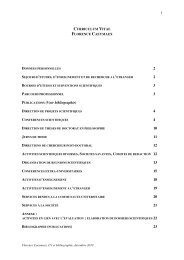Subjectivations politiques et économie des savoirs - Service de ...
Subjectivations politiques et économie des savoirs - Service de ...
Subjectivations politiques et économie des savoirs - Service de ...
Create successful ePaper yourself
Turn your PDF publications into a flip-book with our unique Google optimized e-Paper software.
– Revue <strong>de</strong> philosophie politique <strong>de</strong> l’ULg – N°5 – Mai 2013 – p. 142<br />
555c ). Plato also calls for greater transparency in business: profits ma<strong>de</strong> in r<strong>et</strong>ail tra<strong>de</strong><br />
should be carefully recor<strong>de</strong>d and be part of the public domain (e.g. 920c). Finally, he<br />
insists that the main purpose played by tra<strong>de</strong> should be a fair redistribution of goods,<br />
and not the maximization of profits. « When goods of any kind are distributed<br />
disproportionately and unequally, anyone who makes the distribution equal and even<br />
cannot fail to do good. It needs to be stated that this redistribution… is precisely the<br />
purpose the tra<strong>de</strong> is meant to serve » (Laws, 918b). In sum, Plato proposes to use the<br />
power of the state to curtail inequality amongst citizens, to restrict excessive luxury and<br />
wealth, and more generally, to make the life of « money-grubbers » difficult and<br />
unappealing.<br />
Citizens’ lust for money must thus be mo<strong>de</strong>rated by what will strike us as remarkably<br />
immo<strong>de</strong>rate legal measures. But to Plato, Magnesia’s legal or<strong>de</strong>r was, on the contrary,<br />
the very embodiment of mo<strong>de</strong>ration. On a more general level in<strong>de</strong>ed, it could be said<br />
that Magnesia’s entire constitution is gui<strong>de</strong>d by principles of measure and harmony –<br />
wh<strong>et</strong>her it concerns land distribution, marriage, the distribution of power, the <strong>de</strong>gree of<br />
freedom permitted, or the <strong><strong>de</strong>s</strong>irable amount of health or wealth to be possessed by an<br />
individual. In all these domains of human life, the Athenian stranger insists that « the<br />
mo<strong>de</strong>rate man is God’s friend » (Laws 716d).<br />
Plato’s no-growth soci<strong>et</strong>y?<br />
This paper sought to reflect not only on various reasons behind the neglect of the virtue<br />
of mo<strong>de</strong>ration in Plato scholarship, but also on the kinds of educational and<br />
institutional measures that might be entailed if one were interested in taking a politics<br />
of mo<strong>de</strong>ration seriously. Evi<strong>de</strong>ntly, these thoroughly utopian proposals would turn our<br />
world upsi<strong>de</strong> down; it is hard to conceive how any of them could be put in place in our<br />
mo<strong>de</strong>rn liberal <strong>de</strong>mocracies. But if we are sincere when we assert that overconsumption<br />
and immo<strong>de</strong>ration are vices and that these may be at the root of our<br />
economic ills (as many like to do), there is little sense in refusing to initiate a reflection<br />
on the virtue of mo<strong>de</strong>ration.<br />
We saw that part of what mo<strong>de</strong>ration entailed according to Plato were a number of<br />
measures that are antith<strong>et</strong>ical to notions that are at the core of our liberal and<br />
capitalist <strong>et</strong>hos – in particular, individual freedom and economic growth. But I have also<br />
indicated that for Plato, a mo<strong>de</strong>rate soul and a mo<strong>de</strong>rate city need not be seen as<br />
<strong>de</strong>void of pleasure, friendship, and comforts. For all his asc<strong>et</strong>ic inclinations, Plato did<br />
not call for the relinquishing of all wealth and material goods, but rather, like his



